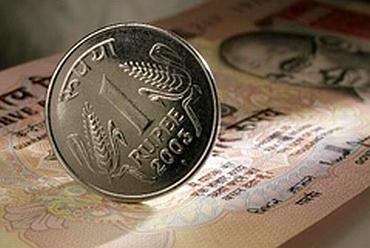
The hottest topic that's doing the rounds at every Indian home at the moment has to be price rise.
Prices of food and other essential commodities are spiralling up like nobody's business and common people are groping for a respite.
Though the lawmakers are coming up with one placebo after another, no immediate solution seems to be in sight.
With onion prices hitting as high as Rs 60 to Rs 100 a kg across Indian cities, the beleaguered aam aadmi is cursing the United Progressive Alliance government for its burdensome economic policies.
We spoke to people from every walk of life and culled their reactions on the present situation.
Click NEXT to read what the common man has to say . . .
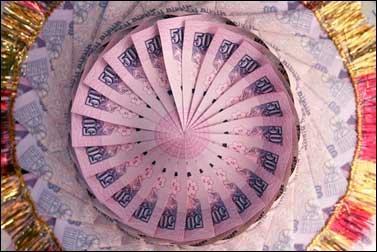
Tamilkudimagal
Banana vendor
"When I quote Rs 3 for one small banana and Rs 10 for a nenthran kai, my customers are aghast. They say I am unnecessarily hiking the price and making money. Do I look like a woman who makes money that way?
"I am 70, yet I stand in the hot sun and rain to sell bananas. I don't sell any other fruits though I used to, a few years ago.
"I don't have the money to buy apples, pomegranate, etc. Banana is the cheapest fruit and I am forced to sell only that.
"If I had been making money, do you think I would be eating plain rice and a sambar that has no paruppu and vegetables?
"This morning my daughter-in-law went to buy vegetables and came back angry. It was she who told me that onions cost Rs 100 and tomatoes Rs 50, PER KG!
"I thought she was lying. I thought it was her excuse to avoid cooking. But when I came here, I found that she was right.
"All my customers were discussing only one topic: the price of onions. Everybody is affected these days, the poor like me, all the more so.
"Today, one of my customers, an auto driver, was so angry that he started abusing all the politicians loudly. I told him to tone down. Everyday, he used to buy two bananas to eat but today, he could afford only one. He said his stomach was full!
"If we can't even buy food to eat, why are we struggling like this? Life has become very, tough for all of us."
. . .
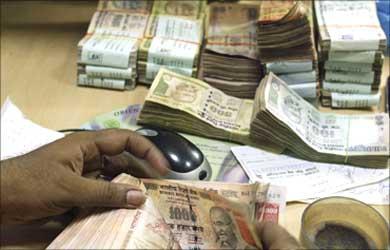
Tathagata Banerjee
Assistant professor of English
"Who is hit hardest by the food price rise? Do the rich really care about the price of bread? Most of the time, they eat cake anyway.
"Many of them, I'm sure, aren't even aware that food prices have risen spectacularly in the last couple of years, and that they continue to rise.
"Even when they're actually in the country and not touring the Swiss Alps, they're content to leave such small matters in the able hands of those who do the groceries for them.
"The great Indian middle class suffers a little, of course. They have to postpone buying the new dress till next month, turn their paneer days into radish days, and leave the scooter under its plastic cover, taking the crowded bus to work instead.
"But at least they have their radish. What do the poor eat? They don't pay bus fares, and their new dresses are postponed forever. Still, they have to eat.
"At the little pond-side market where I buy my fish and vegetables in the morning, out of the edge of my eyes I can see shadowy characters hovering around the stalls. I buy a little fish, some farmfresh produce. A Rs-500 note goes up in smoke.
"Meanwhile, the shadows wait. When regular customers leave, they haggle with the sellers for the fish bones and entrails, chicken heads and intestines, vegetable peelings.
"Normally the sellers would discard this stuff, and some still do, which are then picked up for free. But some find business opportunity even here, and try to extract a few rupees.
"That is what the poor eat. I don't know how they cook those things, or what they use for staple, because oil, spices and foodgrain are spiralling upwards as fast as everything else.
"I try to ignore these things like most other middle-class people, thinking it isn't really my problem.
"But then my bad conscience is tortured by the feeling that bits and pieces from the lower part of the middle range seem to be silently breaking off and floating into the shadows.
"The other day I saw a beggar woman at the railway station. She was carrying a child, and looked a bit too dignified for her occupation. When I saw her face, I remembered that she had been to my house a few times, a year or so before, with her husband.
"They hadn't been beggars then, but a hardworking, lower-middle-class couple who had come to sell saris to my mother and wife. It gave me the goosebumps, and I looked away. Sure I was a long way above them, but still it felt like a blow to the stomach.
"The way things are going, who can say what the future holds for people of my class? Even as we aim to get a permanent seat in the Security Council, more and more of our people die of hunger.
"What are we doing wrong?
"The government says that the current rise is due to increased food demand in rural and poor communities who now have more money in their hands, because the government has been paying high procurement prices under the National Rural Employment Guarantee Act.
"I am no economist. I can only say that I'm rather confused. The government says it is for the common man. But prices keep rising. Consequently, the poor -- the common man -- suffers the most. What am I missing here?
"A UN report says worldwide food prices are going to rise 40% over the next decade, as a result of increased demand in emerging economies. It eases my conscience a bit it is their fault, after all.
"Why must they make such unreasonable demands? The report has served its purpose. The same report says that the jump in food prices will probably also result in a surge in landgrabbing by sovereign wealth funds and other powerful investors, which will further marginalise poor rural communities.
"It seems I was wrong. The rich do care about food prices, after all."
. . .
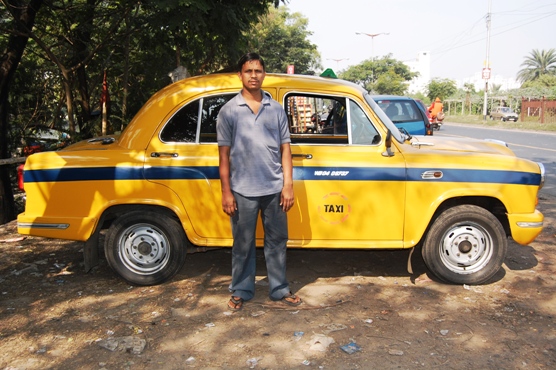
Vijay Singh
Taxi driver
"As I was growing up in the dingy by-lanes of north Kolkata, I heard that in a true democracy, common people's lives gradually improve. If that is the case, then India is a fake democracy.
"For, over the last five years, my life has moved from bad to worse. My income has halved and my expenditure has doubled.
"I got married a couple of years back. To be honest, had I known that the United Progressive Alliance government would bring the economic state of the country to this state, I wouldn't have.
"Now, I am struggling hard to keep our family of three, including my 6-month-old daughter, afloat. Working as a cabbie, I used to earn Rs 300-350 a day even three years back.
"But now, I don't get as many passengers and my income has come down to Rs 250. Simultaneously, my expenses have risen, adding to my woes.
"It's a crazy situation. There has been more than 80 to 100 per cent rise in the prices of vegetables and other essential items.
"I have a feeling it's the UPA government's garibi hatao movement under a sham."
. . .
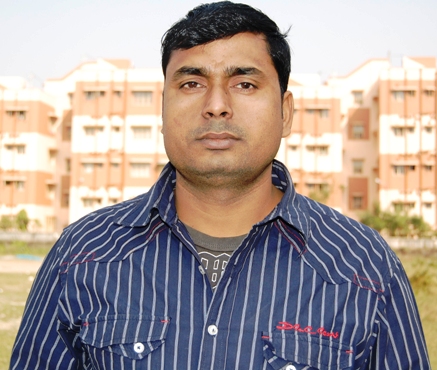
Raju Mishra
Businessman
"Can you imagine that onions now come for Rs 80 a kg? What will we eat? Probably, the UPA government wants people like us to eat less and stay slim. Soon people will be forced to rob and steal."
"Ever since this government came to power, it successfully messed up the Indian economy. It is strange because two ace economists like (Prime Minister) Manmohan Singh and (Finance Minister) Pranab Mukherjee are at the helm.
"I refuse to believe that these two people don't understand the gravity of the situation. I feel they do realise that the economic situation of the country is in a mess yet not take any step. Perhaps, it's a deliberate attempt on their part to make the people like us suffer.
"Who but they know that if there is a sense of discomfort among the electorate, it would stay subservient to the ruling party. An improvement in the living standards of the people may not augur well for the UPA in the next election.
"Hence it is taking well-calculated steps to keep the aam aadmi under pressure."
. . .
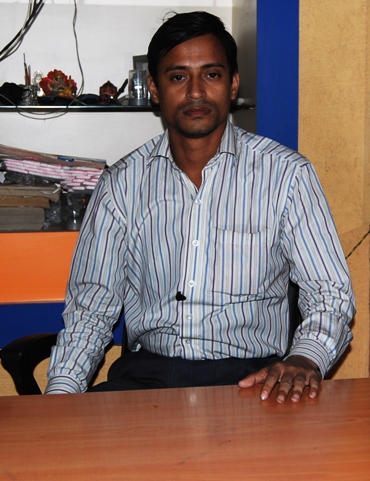
Sheikh Amjad Ali
Self-employed
Andher nagri, chaupat raja,
Taka ser bhaji taka ser khaja
Aa mil ke khayen raja. . .
"I cannot help but quoting this oft-repeated Hindi poem. The present UPA government has failed to offer a healthy governance to its people.
"In a democracy, the first and the foremost duty of the ruling party is to feed its own people. In that respect, this government has failed completely.
"It has only achieved one feat -- that of hiking inflation like nobody's business. Right from day one, the government turned a blind eye to the issue of price rise and now it has gone beyond repair.
"Who could imagine that the prices of onion will come to Rs 80 per kg one day? Earlier, we could buy a bag full of vegetables for Rs 100. Now, even Rs 500 isn't enough to sustain us for a couple of days.
"The middle class and the lower class are the worst hit. What is stranger, thanks to an erratic policy of this government, the gold and diamond prices are coming down and prices of vegetables are going up.
"We are living in an insane country!"
. . .
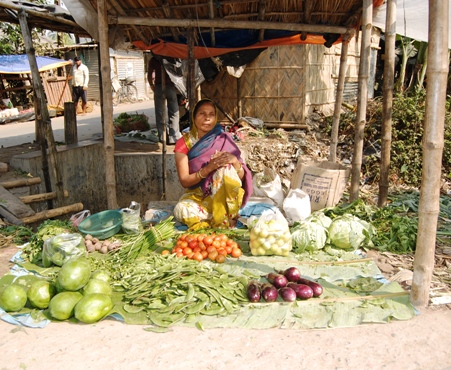
Arjina Gazi
Vegetable vendor
"Our family of three has always been poor. But we could at least afford two square meals a day. Not any more.
"Thanks to the cruel inflation and the central government's lousy economic policy, Rs 3,000 that we earn a month is just not enough to feed us twice a day.
"Hence, we decided from last week to cut down one meal and have plenty of water instead to keep ourselves full. My eyes well up with tears when I think of my nine-year-old daughter who died an untimely death of anaemia as we could not afford her treatment.
"Now I shudder to think what will happen if any one of us falls sick. Our financial situation has come to such a head that should any one fall sick, we would not be able to buy any medicine whatsoever.
"With prices of essential items skyrocketing, we have lost the zeal to live. Has the government forgotten that we, the poor, too have elected it to power?
"The electorate does not consist of the rich alone and it's time the government realised that. But then, I am expecting too much.
"This government is heartless. And deaf and blind!"
. . .
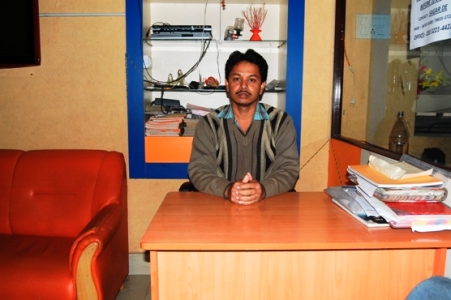
Nurul Hasan Siddiqui
Senior Data Entry Officer
"At the moment, I am in no mood to talk. For, I just cannot help laughing! We are living in a strange country that has stranger economic policies.
"Inflation has always been a vexing problem for this UPA government. But what has it done? Nothing! Prices of essential commodities have gone through the roof and the government just preferred to sit idle. Why?
"This is but natural! Any government is but supposed to be blind to the people's woes.
"If it isn't then it tends to be benevolent and that is against the primary prerequisite for any ruling authority.
"At the moment, everybody is talking about the spiraling prices of vegetables, especially that of onions (Rs 80-100/kg).
"Such will just be the case in a country like ours where economic policies are framed in a way to ruin and demolish the poor.
"Just imagine, a mobile SIM card comes for Rs 10 whereas you need to cough up more than Rs 500 to buy vegetables to last you a week. It's a hilarious state of affairs."
. . .
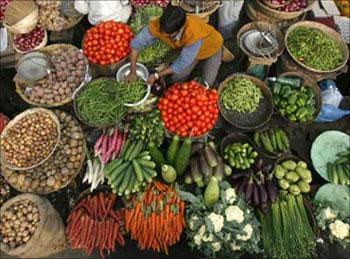
Geetha
Housemaid
"If you think we buy vegetables everyday because we have no fridge at home, you are wrong. I keep aside some money daily to buy vegetables, rice, milk, etc. But prices have just gone out of my reach.
"Yesterday, I went to buy vegetables and found that what I used to buy for Rs 20 now costs Rs 60! I was shocked.
"When I questioned the vegetable vendor, he said, onions cost Rs 100/kg, tomatoes Rs 50 and one drum stick Rs 10! What's all this?
"How does one expect people like us to buy vegetables? I can make do with only one cheap vegetable in sambar but what about paruppu?
"We used to have a drum stick tree at home. Now, that is also not there.
"Never in my life did I have to cough up so much for vegetables. If I have to shell out Rs 60 daily for vegetables alone, how am I going to buy rice, milk, oil, sugar, tea and other food items?
"Is this world only for the rich? Is it that they alone have the right to feed themselves? What are we poor supposed to do? Starve to death?"
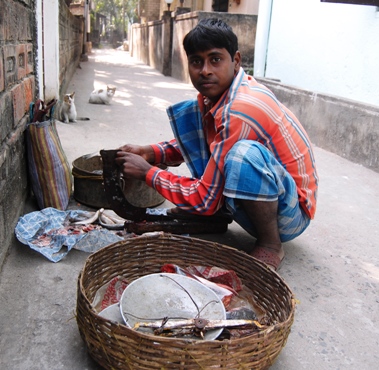
Sahabuddin Gayen
Fish-seller
"My father used to tell me quite often that a time will come when mere subsistence for the poor like us would be a problem.
"As a teenager, I never paid any heed to his words. But now that I am a father myself, I know what he meant. I am an illiterate person and am not equipped enough to deliver lectures.
"Yet I know that it is any government's duty to feed its people. If it cannot, it should resign.
"The government that we, the people of India, brought to power in 2009 has failed to deliver and, therefore, it must go.
"That day is not far when people like us would soon be forced to beg. Prices of essential commodities have hit the roof and yet there has been no effective step to control them.
"I refuse to believe that there are no capable people at the Centre who can deal with the issue. There are many efficient hands. But the government does not want to solve the problem as that might make the common people comfortable -- too comfortable.
"It is the government's clever strategy to keep us under pressure. If we starve, we will only focus on food.
"Issues like bad governance, corruption, nepotism will never draw our attention. The government needs to keep the burning issue of hunger alive so that other vexing matters can be swept under the carpet."